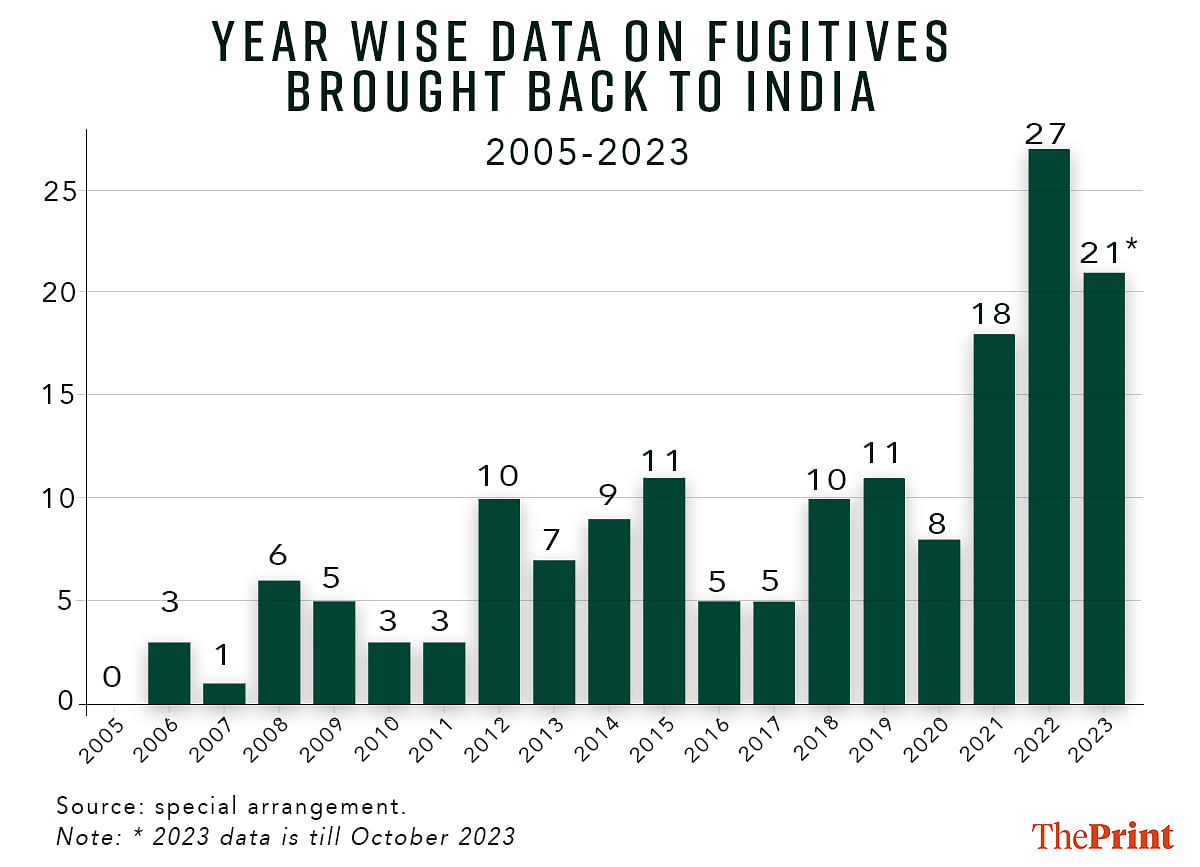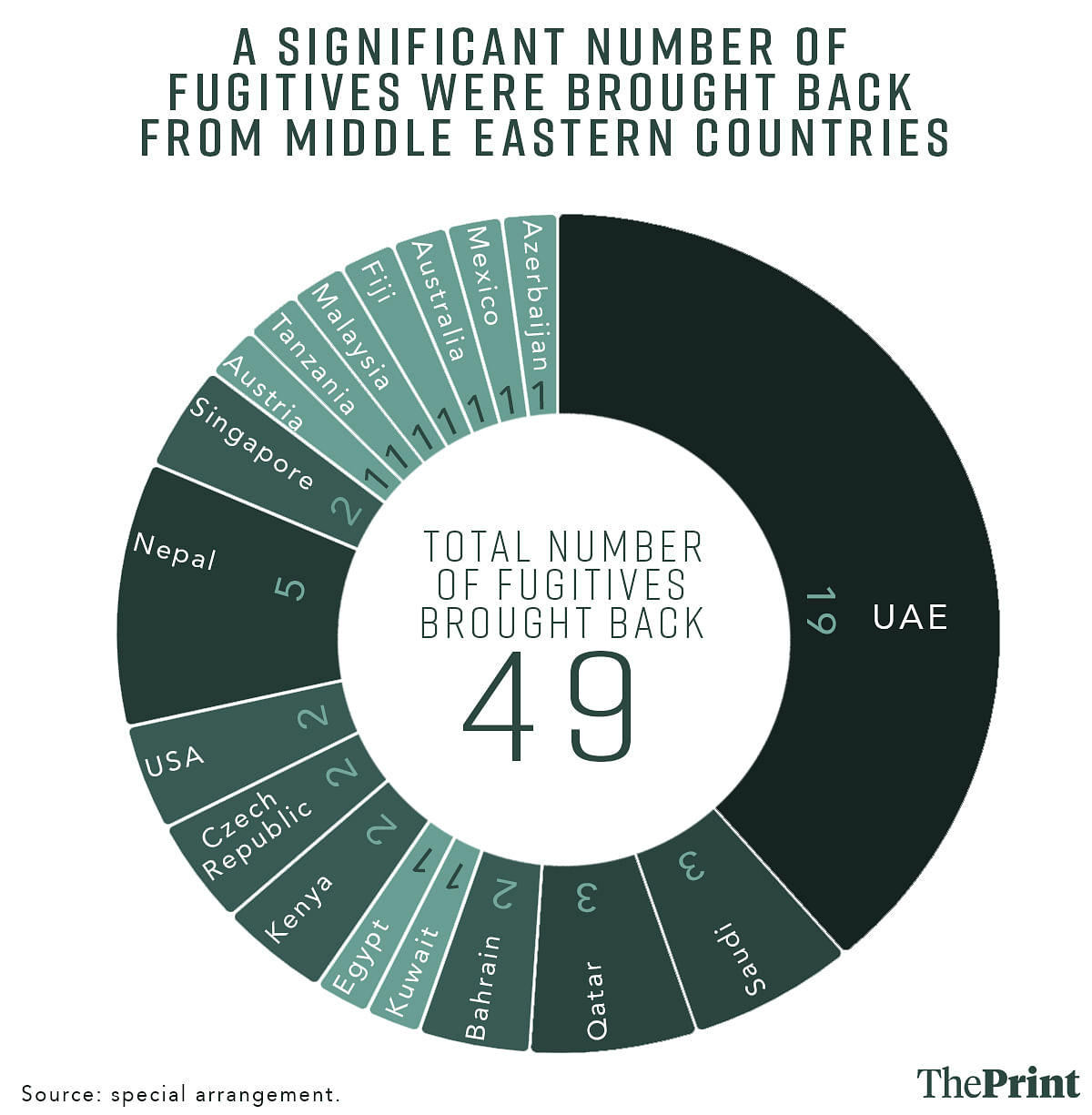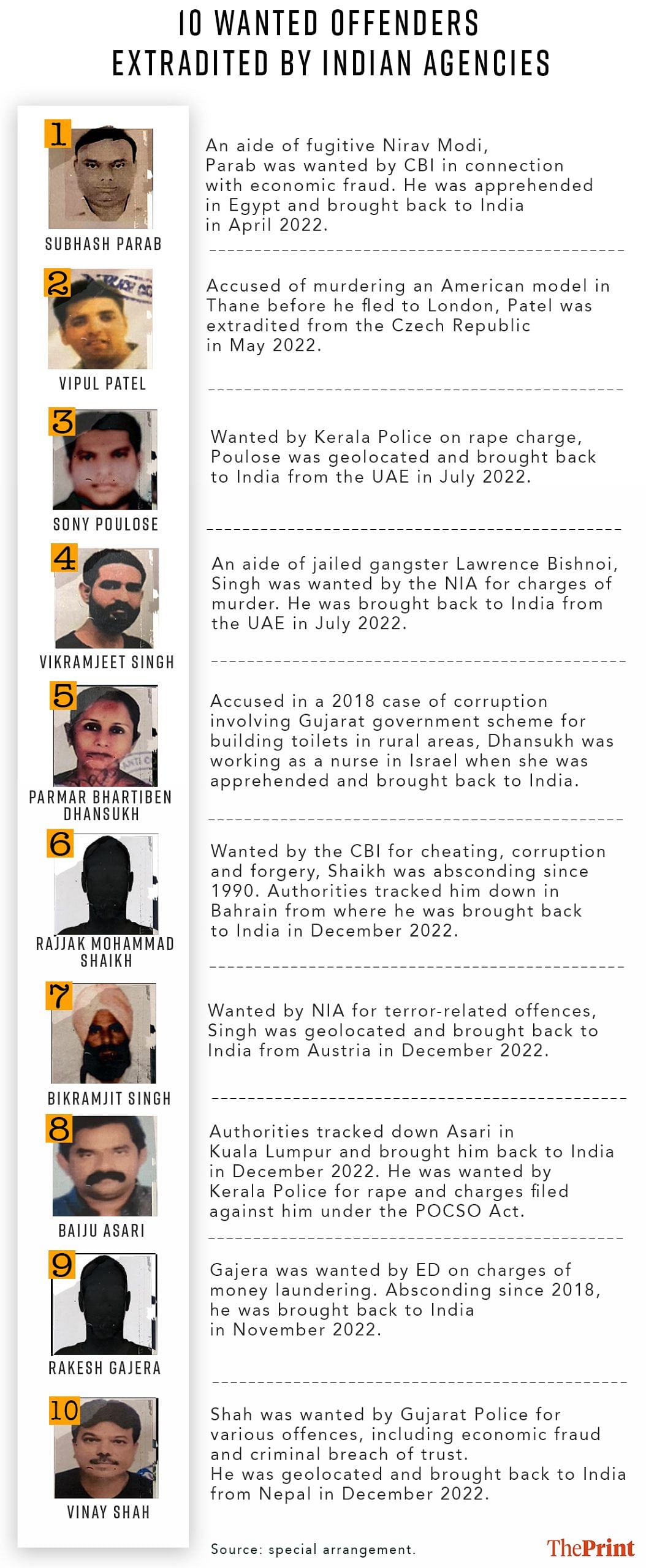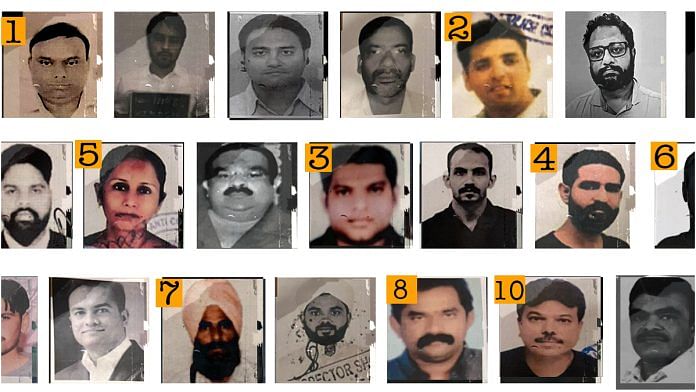New Delhi: Vipul Manubhai Patel, a London-based engineer for nearly two decades, was on a trip to Prague with his pregnant wife when his past caught up with him. Patel, who fled India in 2003 after being accused of the murder of an American model in Thane, could never have anticipated that the law might get to him after all these years.
On 27 May last year, Maharashtra Police, with assistance from the Central Bureau of Investigation (CBI), brought Patel back to India to face trial in the case.
Bhartiben Dhansukh (57) also found the law catching up with her earlier this year in a 2018 case.
Accused of being involved in a 2018 case of corruption pertaining to a Gujarat government scheme for building toilets in rural areas, Dhansukh had fled to Israel. Law agencies eventually tracked her down in Tel Aviv, where she was working as a nurse. She was brought back to the country on 4 January this year.
In another instance, Rajjak Mohammad Shaikh, wanted by the CBI and Anti-Corruption Bureau (ACB), Gandhinagar, in a case of corruption, cheating and forgery, had built a new life in the Gulf. He too was brought back last December — 33 years after he had fled India.
The three are part of a cohort of 49 fugitives who were brought back to India with the help of the CBI in 2022-23.
According to data accessed by ThePrint, the tally of 22 fugitives repatriated this year (until October) marked a staggering 340 percent surge compared to just five in 2017 — the year CBI began to approach the process with more vigour, according to sources. Sources added that the process has got a further push since Praveen Sood joined as CBI cirector in May this year.
This year’s tally marks a 340 percent increase from the average count of fugitives repatriated over a period of 13 years, between 2005 and 2017 (2005 is since when data is available).
A significant number of these fugitives were brought back from Gulf countries, many at the request of Kerala Police. Further, sources said that efforts are underway to bring back another 184 fugitives whose current locations have been confirmed.
Data shows that while no fugitives were repatriated in 2005, three were brought back in 2006, one in 2007, six in 2008 and five in 2009, followed by three each in 2010 and 2011. The tally rose to 10 in 2012, dipped to seven in 2013 and went up again to nine in 2014.
In 2015, Indian investigative agencies tracked down and brought back a total of 11 fugitives, but the momentum did not last and the number dropped to five each in 2016 and 2017. It then rose to 10 in 2018, 11 in 2019 and eight in 2020.
In 2021, however, a total of 18 fugitives were repatriated, followed by 27 in 2022 and 22 this year. The tally for 2022 was the highest in the past 18 years (since 2005).

Sources in the CBI attribute the heightened success rate to an “expanded informer network” and “enhanced multi-agency coordination”.
According to sources, Interpol’s role in accelerating the flow of information, aiding in geolocation of wanted criminals and facilitating their return has played a key role in this exercise. So has the establishment of a CBI Global Operations Centre and the agency’s focus on exchange of information with law enforcement agencies of other countries.
“This centre (Global Operations Centre) helped immensely in facilitating rapid exchange of information with global agencies and local police. It also ensured faster sharing of information and dissemination of data,” said a source.
The source added that “concerted and focused efforts of the CBI including geolocating criminals, bilateral engagement with international agencies, increased international police cooperation and also prompt reciprocation of requests from other countries for deportation of people accused of crimes in their home countries, have resulted in a significant increase in the number of wanted fugitives and criminals wanted by Indian law enforcement agencies being brought back”.
While the request to bring back fugitives is initiated by state police, the CBI being the nodal agency of Interpol in India coordinates all international police assistance via Interpol channels, with 194 countries. For this purpose, the CBI’s international police cooperation unit now has Interpol liaison officers in all central, state and UT law enforcement agencies.
The idea behind this was to mount a coordinated crackdown on transnational crimes and to track down criminals across international jurisdictions.
The CBI issues all Interpol colour-coded notices (Red, Blue, etc.) on behalf of Indian law enforcement agencies. These notices aid the individual’s provisional arrest in whichever country he/she may have sought refuge.
For instance, a Red Notice is a request issued by Interpol to locate and provisionally arrest an individual awaiting extradition. It is issued by the Interpol General Secretariat at the request of a member country or an international tribunal, based on a valid arrest warrant.
Also Read: 8 years in US prison, ‘drug hauls, money laundering’: The murky past of Paradiso’s Ashok Solomon
‘Good relations with Middle East’
Data on fugitives shows that a significant number of them were brought back to India from the Middle East, at the Kerala Police’s request. Among the 49, 19 were found to be in the UAE, 3 in Saudi Arabia, 3 in Qatar, 2 in Bahrain, and 1 each in Kuwait and Egypt.
According to a second CBI source, this was made possible by the “good relations” India enjoys with these countries, especially the UAE.
Further, it is learnt that the CBI has been extremely proactive in locating criminals, wanted by foreign law enforcement agencies, hiding in India. In 2022-23, 414 such criminals were traced and their whereabouts conveyed to the countries concerned.
“It is quid pro quo. They help us and we help them. With countries like the UAE and others in the Middle East, this coordination has worked very well. This helps us bypass the lengthy extradition process. When any criminal is located in a cooperating country, rather than formal extradition, they inform us, revoke the papers and expedite deportation,” said the second source.

The CBI, it is learnt, also coordinates execution of arrest warrants issued by extradition courts on the basis of requests from foreign countries. “Due to reciprocity in assistance rendered, there is enhanced cooperation from concerned countries,” the source added.
Besides 19 from the UAE, five fugitives were brought back from Nepal, and two each from Kenya, Czech Republic, the US, Nepal and Singapore in 2022-23. Similarly, one each was repatriated from Austria, Tanzania, Malaysia, Fiji, Australia, Mexico and Azerbaijan.
Geolocation & ‘proactive outreach’
CBI sources also revealed that the current location of 184 criminals wanted by India have been confirmed and efforts are on to bring them back.
“Operation Trishul was started in coordination with Interpol for expediting information flow from international law enforcement agencies to geolocate criminals wanted by India and it has been done for several wanted fugitives,” said the second source.
Geolocating, in this context, is the process to ascertain one’s current geographical location by analysing data collected from various sources including but not limited to GPS satellites, cellular towers and Wi-Fi networks.
“A fugitive may also have changed his or her identity after reaching a new country, but they can still can be located using technology and a profile match,” said the second source.
A third source in the CBI added that India has made a “proactive outreach” to specific countries. “CBI has been reaching out to specific countries via Interpol channels where the criminals are suspected to be and requesting their assistance in geolocation and formal confirmation of location. Once that is done, the process proceeds,” the source added.
Once geolocated, the individual is detained by authorities in the country acting on the extradition request and the same is conveyed to India. It is only then that the formal process for deportation/extradition begins.
However, bringing a fugitive back is a long-drawn process.
After securing approval for deportation/extradition, the CBI’s Global Operations Centre coordinates with law enforcement agencies of the country in question to complete other formalities. It also has to coordinate with other countries in cases where, for instance, a fugitive is transiting another country in the process of being deported/extradited to India.
“One has to coordinate not just with the country where the fugitive is, but also with the airlines he/she will be flying and countries they will transit. Planning the entire route and obtaining clearances is crucial to this exercise, as some countries may refuse transit,” the third source said.

According to the source, the process of bringing fugitives back to the country also gained impetus after India hosted delegates of 168 countries for the 90th Interpol General assembly last October.
The source added, “The CBI has been offering a large number of capacity-building programmes for police personnel across the world via CBI Academy. It recently joined the Interpol Global Academy Network.
“The CBI also hosted the Interpol Young Global Police Leaders Programme in 2023 with participation from 44 countries. These activities have enhanced the level of goodwill and cooperative assistance on criminal matters from foreign countries.”
(Edited by Amrtansh Arora)
Also Read: Out of jail in 2030 — how Abu Salem pushed India to honour its promise to Portugal



